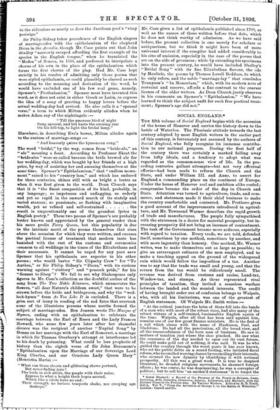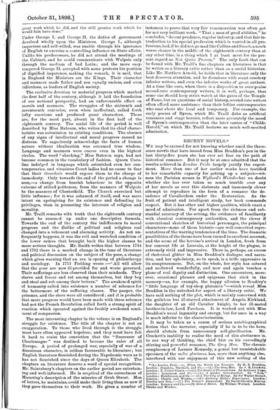SOCIAL ENGLAND.*
THE fifth volume of Social England begins with the accession of the house of Hanover and carries the history down to the battle of Waterloo. The Pharisaic attitude towards the last century adopted by most English writers in the earlier part of this century, is fortunately not assumed by the authors of Social England, who fully recognise its immense contribu- tion to oar national progress. During' the first half of
the century there was certainly a marked falling away from lofty ideals, and a tendency to adopt what was regarded as the common-sense view of life. In the pre- ceding centuries gallant attempts—but not very effectual
efforts—had been made to reform the Church and the State, and under William III. and Anne, to assert for
England a commanding place on the continent of Europe. Under the house of Hanover zeal and ambition alike cooled; compromise became the order of the day in Church and State. Attention was turned to agriculture, trade, and com- merce, and statesmen made it their chief business to make the country comfortable and contented. Mr. Prothero gives a good account of the improvements introduced in agricul- ture, and Mr. Townsend Warner describes the rapid growth of trade and manufactures. The people fully sympathised with the statesmen in a desire for material prosperity, but in- creasing prosperity did not bring an increase of contentment. The task cof the Government became more arduous, especially with regard to taxation. Every trade, we are told, defended
itself, sometimes by one method, sometimes by another, and with more ingenuity than honesty. One method, Mr. Warner writes, was to make themselves out as large as possible; to give an extravagant estimate of the men employed, and to make a touching appeal on the ground of the widespread ruin which would follow the imposition of a tax. Another
was to say that the trade was small and young, and that the return from the tax would be ridiculously small. The revenue was derived from customs and excise, Land-tax, Window-tax, and stamps. As these represented rival principles of taxation, they invited a ceaseless warfare between the landed and the monied interests. The credit of having brought order out of confusion belongs to Walpole, who, with all his limitations, was one of the greatest of English statesmen. Of Walpole Mr. Smith writes :—
" At the critical juncture the helm of State fell into the hands of a man who with most of the robust vices, had also many of the robust virtues of a self-trained, businesslike English squire of the time. Walpole, after all that has been said against him, remains one of our few great finance ministers. He is the first of a roll which closes with the name of Huskisson, Peel, and Gladstone. He had all the penetration, all the broad view, and all the resourcefulness of the born man of business. He saw in matters of taxation just where the shoe pinched. He saw what the commerce of the day needed to open out its vast future. He could make gold out of nothing, it was said. It was he who guided the country through the worst panic it has ever known, who set the public debts on a sound footing, who initiated fiscal reform, who reconciled warring classes by reconciling their interests, who secured the new dynasty by identifying it with national prosperity. All this was a great work. It is true he despised literature, he dreaded religious movements, he shunned foreign affairs ; he was coarse, he was domineering, he was a corrupter of politics ; but to call him an unidea'd statesman' is to forget the • Social England: a Record of the Progress of the People in Religion, Laws, Learning, Arts, industry, Commerce, Science, Literature, and Manners. from the Earliest Dime* to the Present Day. By Various Writers. Edited by H. D. Train. D.O.L. Vol. V., From the Accession of George I. to the Battle of Waterloo." London : Cassell and 00.
ore at work which he did, and would fain have done."
Under George I. and George II. the duties of government devolved wholly upon the Ministers. George I., although imperious and self-willed, was unable through his ignorance of English to exercise a controlling influence on State affairs. Unlike his predecessors, he did not attend the meetings of the Cabinet, and he could communicate with Walpole only through the medium of bad Latin; and the more easy- tempered George IL accepted with some protests his position of dignified impotence, making the remark, it is said, that in England the Ministers are the Kings. Their character and manners made father and son equally useless, and even ridiculous, as leaders of English society.
The exclusive devotion to material progress which marked the first half of the century, although it laid the foundation of our national prosperity, had an unfavourable effect on morals and manners. The struggles of the sixteenth and seventeenth centuries, even when ineffectual, called forth lofty emotions and produced great characters. These are, for the most part, absent in the first half of the eighteenth century. The social life of the period is well described by Miss Bateson, who writes that its chief charac- teristic was submission to existing conditions. The absence of any signs of intellectual and moral progress caused no distress. To sagaciously acknowledge the facts of human nature without idealisation was esteemed true wisdom. Language and manners were coarse even in the highest circles. The word "shocking," Miss Bateson says, had not become common in the vocabulary of fashion. Queen Caro- line indulged in language which astonished even her con- temporaries, and vivacious Court ladies had no cause to fear that their gtourderie would expose them to the charge of immodesty. Only towards the end of the period a change is seen,—a change from boorish behaviour to the opposite extreme of stilted politeness, from the manners of Walpole to the manners of Chesterfield. The Church exercised but little influence ; for it was ashamed of itself, and was more intent on apologising for its existence and defending its privileges, than in promoting the interests of religion and morality.
Mr. Traill remarks with truth that the eighteenth century cannot be summed up under one descriptive formula. Towards the end of the century the indifference to moral progress and the dislike of political and religious zeal changed into a vehement and alarming activity. As not nn- frequently happens, it was the evil and wretched condition of the lower orders that brought back the higher classes to more serious thoughts. Mr. Smith writes that between 1741 and 1782 there is a marked change in the tone of literature and political discussion on the subject of the poor, a change which gives warning that an era is opening of philanthropy and sociology. In 1753 Fielding wrote :—" All will allow that the poor are now ill-provided for and worse governed. Their sufferings are less observed than their misdeeds. They starve and freeze and rot among themselves, but they beg and steal and rob among their betters." The awakened spirit of humanity called into existence a number of schemes for the betterment of the suffering classes. The pauper, the prisoner, and the slave were all considered ; and it is probable that more progress would have been made with these schemes had not the French Revolution called forth a strong spirit of reaction which operated against the freshly awakened senti- ment of compassion.
The most interesting chapter in the volume is on England's struggle for existence. The title of the chapter is not an exaggeration. To those who lived through it the struggle must have often appeared hopeless; and they must have felt it hard to resist the conviction that the "Successor of Charlemagne" was destined to become the ruler of all Europe. A period of prolonged war, especially of war of a disastrous character, is seldom favourable to literature; but English literature flourished during the Napoleonic wars as it has not flourished since the days of Queen Elizabeth. The chapters on literature deserve a word of special recognition. Mr. Saintsbury's chapters on the earlier period are entertain. ing and well-informed. He is sceptical of the correctness of Macaulay's description of the miseries of Grub Street. Men of letters, he maintains, could make their living then as now if they gave themselves to their work. He gives a number of the still greater work which he instances to prove that very fair remuneration was often got for not very brilliant work. "That a man of good abilities," he concludes, "decent prudence, regular industry, and that fair in- troduction to his special profession which is wanted in all pro- fessions, had, if he did not go mad like Collins and Smart, a much worse chance in the middle of the eighteenth century than at any other time, is a thing which I at least must for the pre- sent regard as Not Quite Proven." The only fault that can be found with Mr. Traill's fine chapters on literature is that he writes as a literary critic rather than as a social historian. Like Mr. Matthew Arnold, he holds that in literature only the best deserves attention, and he dismisses with scant courtesy inferior writers, and even the inferior works of great authors. At a time like ours, when there is a disposition to over-praise second-rate contemporary writers, it is well, perhaps, that some one should keep strict watch at the gates of the Temple of Fame, but on questions of social history, second-rate writers often afford more assistance than their loftier contemporaries who soar above the local and temporary. For example, the early poems of Byron, which Mr. Traill dubs as artificial romances and stage heroics, reflect more accurately the mood of Byron's contemporaries than the later cantos of " Childe Harold," on which Mr. Train bestows so much well-merited admiration.











































 Previous page
Previous page